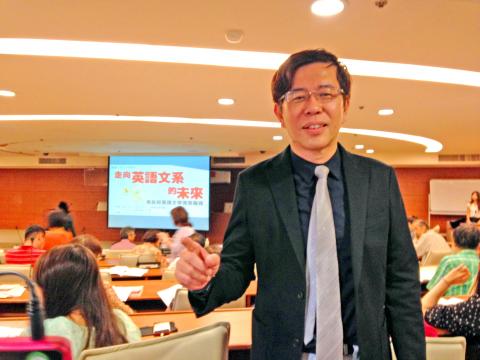How difficult is it for university English departments to attract students? The results of a survey on college and university English-related departments nationwide showed that eight departments have closed down or stopped recruitment over the past eight years. Meanwhile, nine applied foreign languages or English departments transformed into tourism or some other department just to find a way out.
The Global Education Association in Taiwan (GEAT) held a forum on the afternoon of Sept. 12. The GEAT sent a survey to all English departments and received responses from 74 departments. About 31.5 percent of them admitted that they are facing the challenge of student shortage. According to Chen Chao-ming, the results show that English departments are no longer popular when senior high school students and their parents are choosing a university.
Chen is chief executive officer (CEO) of the association and a professor of English at Shih Chien University. He said that since the English proficiency of other majors is equally good or even better than that of English majors, the enrollment numbers for the prospects for English majors are extremely worrying, as are their employment prospects.

Photo: Lin Hsiao-yun, Liberty Times
照片:自由時報記者林曉雲
Chen said that English departments should be redefined and should no longer limit themselves to cultivating English teachers, secretaries or writers. With an advantage in English language, they should provide cross-cultural training and enhance students’ management knowledge and cross-disciplinary specialization. They should cooperate with industries under the major trend of “transnational management” in the future, so as to train students with cross-disciplinary skills and strong English ability.
(Liberty Times, Translated by Eddy Chang)
大學英文系所招不到學生?一份針對全國大專校院英語文相關系所的調查指出,八年來已有八個系所廢系或停招,另有九所學校的應用外文系或應用英文系改名成觀光系等,轉型找出路。
台灣全球化教育推廣協會九月十二日下午舉辦座談會,該會針對大專校院英文系所發出問卷,共回收七十四份問卷,百分之三十一點五受訪系所表示已面臨招生人數不足的挑戰,陳超明表示,問卷結果顯示高中生或家長選擇大學時,不少人對英語文系卻步。
台灣全球化教育推廣協會執行長、實踐大學教授陳超明表示,當其他系所學生的英文能力和英文系學生一樣好,甚至更好時,英語文系招生和就業狀況,讓人焦慮、恐懼。
陳超明表示,英語文系應重新定位,不能再侷限在培育英語教師、英文秘書、文學家等人才,而應善用英語文優勢,置入跨文化訓練、補強管理智識及跨領域專業,配合產業未來跨國界管理的大趨勢,以培育學生成為跨界英語人才。
(自由時報記者林曉雲)
TODAY’S WORDS
今日單字

The 2025 Seoul International Book Fair was held from June 18 to 22 at the COEX Convention & Exhibition Center in Seoul, South Korea. This year, participants from 17 countries attended, with over 530 publishing houses and related organizations taking part. For the first time, Taiwan participated in the book fair as the Guest of Honor, bringing together more than 85 publishers and presenting a curated selection of 550 titles. A delegation of 23 Taiwanese creatives traveled to Seoul to attend the event, including 13 literary authors, six illustrators, and four comic book artists, among which were a film director, an

In late 2024, the suicide of acclaimed Taiwanese author Chiung Yao at 86 sparked a societal debate. She expressed her desire to avoid the difficult aging process and sought to govern her own death rather than leave it to fate. Her statements propelled the issue of “euthanasia” back into the public arena, posing the question of whether Taiwan should legalize euthanasia to grant patients and the elderly the right to die with dignity. Euthanasia, the intentional ending of a life to relieve suffering, is legal for humans in countries like the Netherlands and Belgium but remains prohibited in Taiwan.

A: Wow, the 36th Golden Melody Awards ceremony is set for this weekend. B: I like all the nominees for Best Mandarin Album: Incomplete Rescue Manual by various artists, Outcomes by J.Sheon, Invisible Color by Terence Lam, The Dreamer by Khalil Fong, Haosheng Haochi by Trout Fresh and Ordeal by Pearls by Waa Wei. A: Despite struggling with serious illness, Fong managed to finish his last album before he died. B: With his hit Twenty Three, he is also nominated for Best Song, Lyricist and Composer, and will receive a Special Jury Award for his album. A: And

A: The Golden Melody Awards’ Lifetime Achievement Award will go to both musician Bruce Wong and late singer Jeff Ma. B: Some superstars also won this honor in the past, such as late singer Teresa Teng. A: Speaking of Teresa, have you heard that an unreleased Japanese song of hers was found recently? B: Really? Will the song be released? A: Yes, her track Love Song in the Night Fog is set to be released this month, marking the 30th anniversary of the legendary singer’s death. A: 本屆金曲獎特別貢獻獎頒給樂手翁孝良、已故歌手馬兆駿。 B: 以往有不少超級巨星,像是已故歌后鄧麗君也曾獲此殊榮唷。 A: 說到鄧麗君,你有聽說她生前未發布的日文歌曲被發現了嗎? B: 真的嗎?新歌會公開嗎? A: 這首歌《情歌最愛夜霧時》預計本月發布,正好紀念傳奇歌后去世30週年! (By Eddy